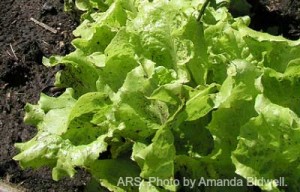A new study has found that older leaves of lettuce support higher levels of Salmonella bacteria. The study, published in FEMS Microbiology Letters (ahead of print) in Oxford Journals, reinforces the concept of purchasing bagged lettuce that is as far away from the expiration date as possible.
 Salmonella binds to leaves of salad crops and survives for “commercially relevant periods” according to the study. Scientists found that attachment levels were higher on older leaves than on younger ones. The differences were associated with leaf vein and stomatal densities, leaf surface hydrophobicity, and leaf surface soluble protein concentrations.
Salmonella binds to leaves of salad crops and survives for “commercially relevant periods” according to the study. Scientists found that attachment levels were higher on older leaves than on younger ones. The differences were associated with leaf vein and stomatal densities, leaf surface hydrophobicity, and leaf surface soluble protein concentrations.
Foodborne illnesses from leafy greens are on the rise in this country. During the time period 1996 to 2005, leafy green consumption increased 9%, and leafy green-associated outbreaks increased 39%. Some of these outbreaks were widespread, suggesting that contamination occurred before the lettuce reached consumers.
In 2006, lettuce and tomatoes caused a nationwide outbreak of Salmonella that sickened hundreds of people in at least 19 states. In 2009, a Salmonella outbreak that sickened at least 124 people was due to contaminated shredded lettuce. And lettuce was recalled for potential Salmonella contamination in April 2013.




